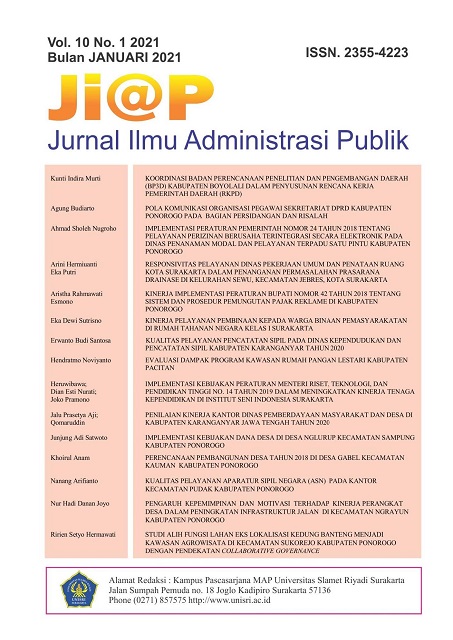KOORDINASI BADAN PERENCANAAN PENELITIAN DAN PENGEMBANGAN DAERAH (BP3D) KABUPATEN BOYOLALI DALAM PENYUSUNAN RENCANA KERJA PEMERINTAH DAERAH (RKPD)
DOI:
https://doi.org/10.33061/jp.v10i1.5104Keywords:
action, communication, division of labor, disciplineAbstract
The research purpose was analyzed the coordination undertaken by the Badan Perencanaan Penelitian dan Pengambangan Daerah (BP3D) of Boyolali Regency in preparation of Regional Government Work Plan (RKPD). Research method used descriptive qualitative. Data collection techniques used interviews, observation, and documentation. Data analysis technique used Miles and Huberman intractive models. Validity data testing used triangulation techniques. Based on research results it can be concluded 1) The actions unity have been able to run well; 2) Communication has been going well that was carried out in the form of deliberations, coordination meetings, and Focus Group Discussions; 3) The division of work is very clear and reflects the ability of BP3D Boyolali Regency to work in a structured and planned manner; and 4) Discipline has been going well, this can be seen from the ability to complete the stages of RKPD preparation in accordance with a predetermined time frame.Downloads
Published
2021-02-15
How to Cite
Murti, K. I. (2021). KOORDINASI BADAN PERENCANAAN PENELITIAN DAN PENGEMBANGAN DAERAH (BP3D) KABUPATEN BOYOLALI DALAM PENYUSUNAN RENCANA KERJA PEMERINTAH DAERAH (RKPD). JI@P, 10(1). https://doi.org/10.33061/jp.v10i1.5104
Issue
Section
Artikel
License
Authors who publish this journal agree to the following terms:
- Authors retain copyright and grant the journal right of first publication with the work simultaneously licensed under a Creative Commons Attribution License that allows others to share the work with an acknowledgement of the work's authorship and initial publication in this journal.
- Authors can separately make additional contractual arrangements for non-exclusive distribution published by the journal (e.g., publish it in a book), with an acknowledgement of its initial publication in this journal.
- Authors are allowed and encouraged to send their work via online (e.g., in the institutional repositories or their website) after published by the journal.













